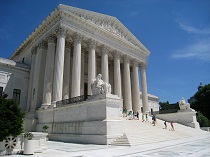
To bring a lawsuit in federal court a plaintiff must be injured to have “standing” per Article III of the U.S. Constitution. But what if Congress allows plaintiffs who have suffered no concrete harm to sue based upon a mere violation of statute? The Supreme Court will decide whether such plaintiffs have Article III standing in Spokeo v. Robins. Thomas Robins sued a website operator, Spokoe, for willfully violating the Fair Credit Reporting Act (FCRA) by publishing inaccurate personal information about himself. The Ninth Circuit concluded that Robins had Article III standing to sue Spokoe in federal court though his only harms were anxiety and possible lost employment prospects. “First, Congress’s creation of a private cause of action to enforce a statutory provision implies that Congress intended the enforceable provision to create a statutory right. Second, the violation of a statutory right is usually a sufficient injury in fact to confer standing.” So, Robins had standing because the FCRA does not require a showing of actual harm when a plaintiff sues for willful violations. If Robbins wins, state and local governments may be sued under in federal court under the Fair Housing Act (FHA), the Americans with Disabilities Act (ADA), and the Driver’s Privacy Protection Act (DPPA) even if the plaintiffs are unharmed.
New, Reduced Membership Dues
A new, reduced dues rate is available for CAOs/ACAOs, along with additional discounts for those in smaller communities, has been implemented. Learn more and be sure to join or renew today!
